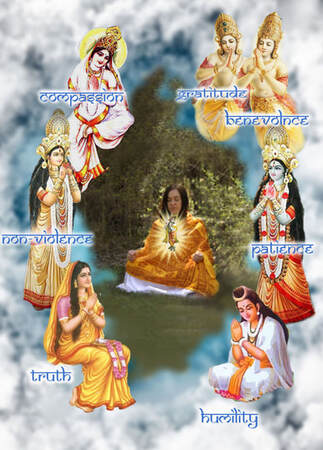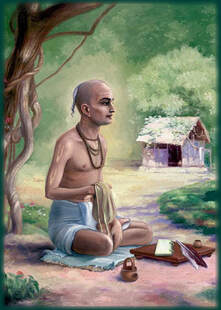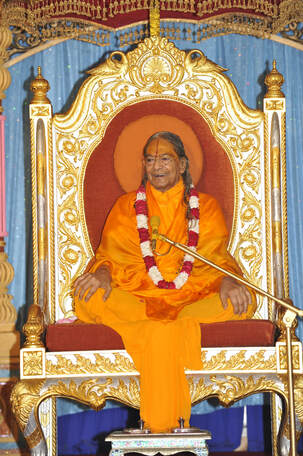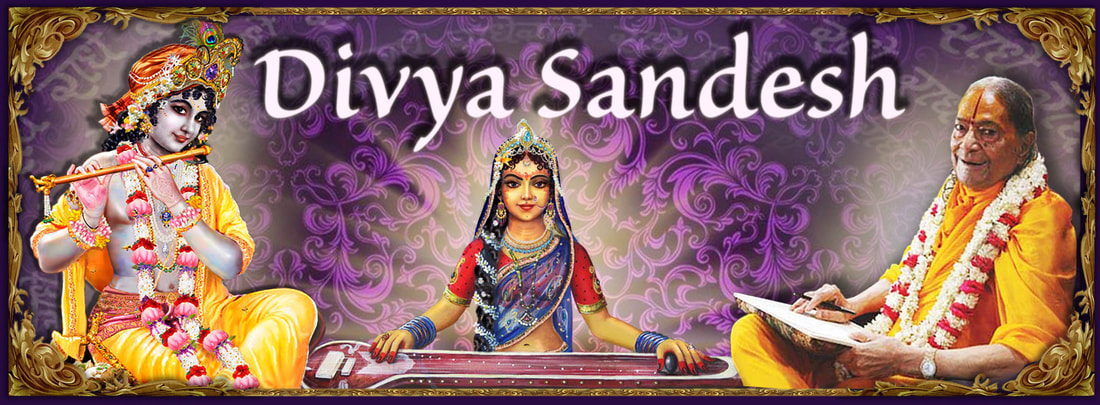 Tattva gyan vs all knowledge. What would do you rather choose?
Tattva gyan vs all knowledge. What would do you rather choose?
The Sanskrit word Gyan means knowledge.
Since there are 2 realms - Material and Divine; the entire body of knowledge could also be divided into two parts :
Material knowledge - Knowledge about things in the realm of Maya is referred to as material knowledge. The material realm comprises the knowledge about the 7 loks below the earth called adho lok, mrityu lok (earth), and all the loks above the earth called urdhav lok. The highest of the urdhav lok is the abode of Brahma. Any knowledge pertaining to any domain in the material realm e.g. medicine, music, astrology, palmistry, mathematics, interpersonal skills and numerous others fall within this category.
This knowledge can be further classified into two categories :
Since there are 2 realms - Material and Divine; the entire body of knowledge could also be divided into two parts :
- Material Knowledge and
- Scriptural Knowledge
Material knowledge - Knowledge about things in the realm of Maya is referred to as material knowledge. The material realm comprises the knowledge about the 7 loks below the earth called adho lok, mrityu lok (earth), and all the loks above the earth called urdhav lok. The highest of the urdhav lok is the abode of Brahma. Any knowledge pertaining to any domain in the material realm e.g. medicine, music, astrology, palmistry, mathematics, interpersonal skills and numerous others fall within this category.
This knowledge can be further classified into two categories :
- Theoretical – Acquiring adequate knowledge of the subject without putting it into practice is referred to as theoretical knowledge. Such knowledge is incomplete e.g. memorizing the driving handbook without practicing driving will not make you a safe driver.
- Practical – Practical knowledge of any subject is acquired through day-to-day hands-on experience. For example, physically operating the machinery after attaining the knowledge about its mechanics, its operation and safety rules.
Spiritual knowledge - The knowledge which enhances the understanding of the divine realm is known as Spiritual knowledge. Spiritual knowledge is also of two types :
- Theoretical – If one memorizes the scriptural verses then one is said to have theoretical knowledge of the spiritual realm. If one goes a step further and understands the meaning of those verses but still does not put it into practice, he remains within the realm of theoretical knowledge. E.g. if one knows the scriptural definition of Jeev, Maya and God but doesn’t practically apply that knowledge in his life.
- Practical – Attaining the relevant scriptural knowledge and practising (sadhana) to attach the mind to God and ultimately experiencing God is called Practical Knowledge of the spiritual realm. God is the source of all knowledge. So when someone knows God, they naturally attain all material and spiritual knowledge.
There are two forms of God:
द्वेवाव ब्रह्मणो रूपे मूर्तं चैवामूर्तं च ।
"dvevāva brahmaṇo rūpe mūrtaṃ caivāmūrtaṃ ca"
"dvevāva brahmaṇo rūpe mūrtaṃ caivāmūrtaṃ ca"
“His personal form (sākāra) and His abstract or Impersonal form (nirākāra)”.
Those who worship the Impersonal form (निराकार ब्रह्म) of God said to follow the path of gyan therefore are called Gyanis (1). Gyanis worship God to attain Mukti (liberation) from Maya and attain Brahmanand. The theoretical and practical knowledge that enables them to attain their goal is called Tattva Gyan.
Likewise, those who worship the Personal form (साकार ब्रह्म) of God are called Bhakts. Bhakts worship God to attain Divine love bliss or Premanand. The theoretical and practical knowledge that enables the Bhakt to attain their goal is also called Tattva Gyan. However, the Tattva Gyan of a Bhakt is different from the Tattva Gyan of a Gyani.
In a nutshell, the form of knowledge (be it material or scriptural) that is devoid of creating spiritual awareness is called gyan, while the specific form of scriptural knowledge which ultimately leads the aspirant to God realization, is called Tattva Gyan.
Likewise, those who worship the Personal form (साकार ब्रह्म) of God are called Bhakts. Bhakts worship God to attain Divine love bliss or Premanand. The theoretical and practical knowledge that enables the Bhakt to attain their goal is also called Tattva Gyan. However, the Tattva Gyan of a Bhakt is different from the Tattva Gyan of a Gyani.
In a nutshell, the form of knowledge (be it material or scriptural) that is devoid of creating spiritual awareness is called gyan, while the specific form of scriptural knowledge which ultimately leads the aspirant to God realization, is called Tattva Gyan.
A question arises, why is it necessary to acquire Tattva-Gyan even for a scholar?

A person who accumulates knowledge without performing devotion becomes excessively conceited. Such a person develops an inflated ego, loses his good qualities, and makes the attainment of public admiration the sole aim of his life. It would take an entire lifetime for an ordinary person to attain adequate knowledge of just one scripture (shastra), then it is obvious that for that person to attain mastery of that same shastra within the same lifetime would be a far fetched dream. If somehow that person were to attain the knowledge of all the subjects within the material sphere and all the scriptures as well (which is not possible in one human life), even then he would not be happy since accumulation of knowledge is NOT the aim of human life. All living beings naturally strive for happiness and happiness alone. And that unlimited divine happiness can only be attained by attaining Tattva Gyan.
If you listen to pandits, who lack devotion but have merely memorized scriptural verses, recite the verses of Gita or Bhagavat, you’d realize that their hearts do not melt and they have no sweetness in their voice. It appears as if they are fighting a verbal war, or showing off their ability to recite verses. Their words are so dry that they are unable to move anybody’s heart. Whereas, when a simple devotee recites the same verse with a heart full of devotion, it incites loving sentiments in the minds of listeners (2).
Real gyan (tattva gyan) makes a person humble.
The more Tattva Gyan one attains, the more one realizes that their knowledge does not measure up to even a drop in the ocean.
Jagadguru Shankaracharya, says:
यदा किंचित्किंचिद् द्विप इव मदान्धः समभवम्, तदा सर्वज्ञोऽस्मीत्यभवदवलिप्तं मम मनः ।
yadā kiṃcitkiṃcid dvipa iva madāndhaḥ samabhavam, tadā sarvajño'smītyabhavadavaliptaṃ mama manaḥ ।
यदा किंचित्किंचिद् बुधजनसकाशादवगतम् तदा मूर्खोऽस्मीतिज्वर इव मदो मे व्यपगतः ॥
yadā kiṃcitkiṃcid budhajanasakāśādavagatam tadā mūrkho'smītijvara iva mado me vyapagataḥ ॥
yadā kiṃcitkiṃcid dvipa iva madāndhaḥ samabhavam, tadā sarvajño'smītyabhavadavaliptaṃ mama manaḥ ।
यदा किंचित्किंचिद् बुधजनसकाशादवगतम् तदा मूर्खोऽस्मीतिज्वर इव मदो मे व्यपगतः ॥
yadā kiṃcitkiṃcid budhajanasakāśādavagatam tadā mūrkho'smītijvara iva mado me vyapagataḥ ॥
|
“When I acquired a little knowledge of the scriptures, I became as arrogant as an intoxicated elephant. But after attaining some spiritual awareness in the association of the Saints, I realized my folly”.
So, Tattva Gyan is the knowledge which leads one towards God realization. Divine virtues naturally start developing in the hearts of those who have Tattva Gyan. The Shrimad Bhagavatam says: यस्यास्ति भक्तिर्भगवत्यकिञच्ना, सर्वैर्गुणैस्तत्र समासते सुराः ।
yasyāsti bhaktirbhagavatyakiñacnā, sarvairguṇaistatra samāsate surāḥ । हरावभक्तस्य कुतो महद्गुणा, मनोरथेनासति धवतो बहिः ॥ harāvabhaktasya kuto mahadguṇā, manorathenāsati dhavato bahiḥ ॥ "While divine virtues naturally bloom in the heart of a God realized Saint(3), the one devoid of devotion is overcome by material flaws".
|
Despite the dangers posed by attainment of pure theoretical knowledge, we cannot condemn the attainment of theoretical knowledge of the scriptures. A wise person uses a bigger thorn to remove a small splinter pierced in his feet, then throws away both of those thorns. Similarly, a wise man uses theoretical knowledge to get rid of ignorance. Thereby, to acquire God-realization, sadhak (devotee) surrenders to the lotus feet of Guru.
|
Human life is short and uncertain while the scriptural treasure is immense. It is impossible to even turn the pages of every scripture within one lifetime. Hence, we must aim to attain only as much knowledge as is sufficient to comprehend the aim of life and then strive to attain it (4). Shri Sanatan Goswami has codified that must-to-attain knowledge into 3 questions –
In simple words, we must know that we are an inseparable part of that God who is personified bliss. Being unaware of this fact we are looking for happiness everywhere else, except in God. Hence, it is imperative to know that we are the divine soul and therefore God alone is our relative (5) and we can know Him only through the guidance of God-realized saints.
|
Our scriptures say -
उत्तिष्ठत जाग्रत प्राप्य वरान्निबोधत ।
कठोपनिषद् १.३.१४
"uttishthata jagrata prapt varanibodhatah"
kaṭhopaniṣad 1.3.14
“Arise and awaken. Attain the true knowledge of God under the able guidance of a genuine saint.”
So, if attaining unlimited divine bliss is your goal then attain Tattva-Gyan. Also, while you attain Tattva-Gyan do NOT let the curiosity to attain myriad of other knowledge distract you from attaining your goal. Know that the time spent in acquiring that knowledge is precious time taken away from spiritual pursuit. So choose wisely and minimize your loss.









